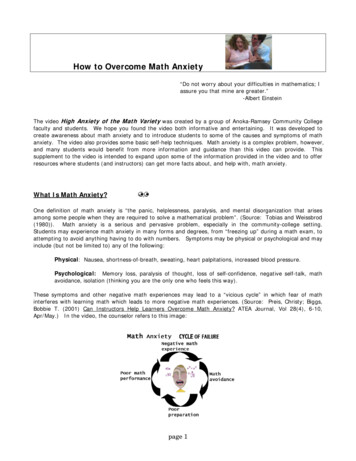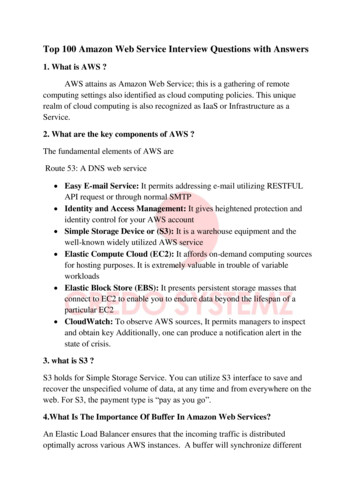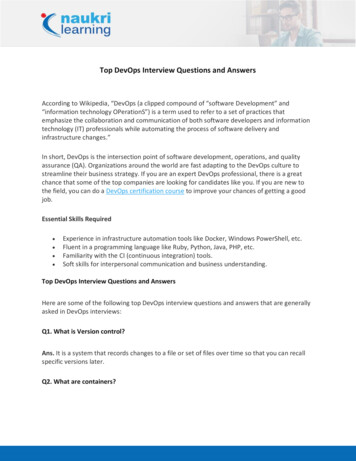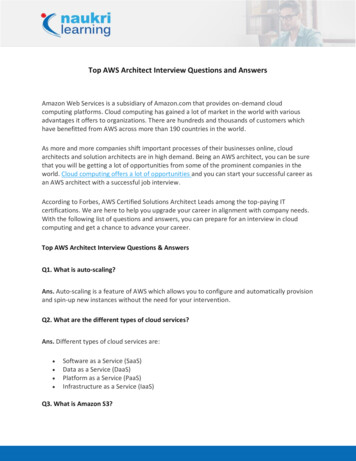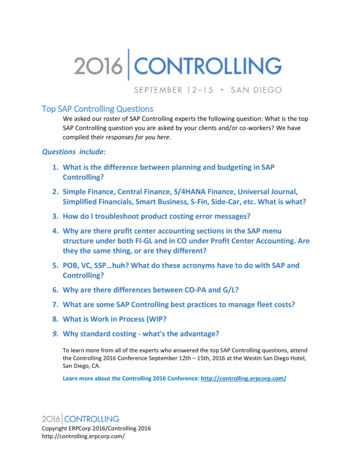
Transcription
How to Overcome the Top 7 ObjectionsConquer Doubts and Close More SalesBy Tom Perkins1
Table of ContentsTable of Contents. 1Introduction. 3Overview. 4The Preparation Phase. 5Anticipate and Strategize . 5Rehearse. 6Have Faith. 6The 7 Main Objections. 7Handling Objections . 8Step 1 – Acceptance. 8Step 2 – Use This Simple Question . 8Step 3 – Speak to the Objection. 9Critical Success Factors for Overcoming Objections . 16Obtaining Permission. 16Challenge / Hold to Higher Level of Expectation . 16Tap Into Emotions. 17From a Position of Experience (Professional Posture) . 17Approach As If You Have Been Coaching the Individual for Six Months . 17Together: Come to a Decision . 17Say What’s On Your Mind . 18Schedule the Next Appointment Before the Prospect Leaves . 18Reach an Agreement and Secure Payment Immediately . 18Avoid Hard /Pressure Selling. 19Offer Free Subscription to Your Newsletter or E-zine . 19Practice Overcoming Objections! . 19Summary . 20Appendix. 21Typical Objections Coachs Often Encounter. 21Exercise: Be prepared! Overcoming objections, resistance and concerns. 23Exercise: Overcoming Objections by Relating to Your Client. 242
IntroductionDear Wellness Coach,The course we are learning today from our marketing series is called, “How to Overcome theTop 7 Objections - Conquer Doubts and Close More Sale!”Once you have effectively mastered the techniques is this course, you will find yourselfpleasantly surprised by the increase in your client base. Your primary business focus should bemarketing. As in most businesses 80% of your time should be focused on marketing (i.e.working on your business and not in your business). An important tool in growing your businessis offering Complimentary Sessions (Comp Sessions). Comp Sessions introduce clients to youand the services you provide, as well as offering a great forum in which to respond to questions,concerns and possible objections that prospective clients may have.Follow the guidelines provided in this course and you will find that you will not only receivefewer objections, but you will close more sales. In turn, this makes it much easier for you toovercome the prospects concerns and doubts on the spot.By following the guidelines recommended in this course your potential client will feel as if theirComp Session was both pleasant and rewarding. They will walk away feeling as if they havetaken a confident step forward in accomplishing something they really want. Furthermore, theComp Session will effectively provide you with a foundation that you can build upon with yourprospective clients in the future.In this course, you will learn: The 7 most commonly heard objections. The simple question that you can use for every objection. How to get the potential client to ask you to “sell them.” Specifically how to handle the money objection. How to unmask the individual’s real issue or concern. Effective methods for addressing common objections often encountered by wellnessprofessionals.By simply following and using these easy guidelines, you will quickly learn how to address justabout any objection.To Your Success and HealthTom PerkinsChief Fitness Business Coach/Advisor &Certified Personal Coach / Fitness Nutritionist3
OverviewA prospective client arrives for a meeting with you or you talk to them on the telephone for theirComp Session. You conduct the Comp Session, following the recommended structure. Yourcoaching provides value. You communicate to the client just how much their health, fitness andgeneral well being will improve by working with you. You’ve connected with them and believethat they would truly benefit from your coaching sessions and expertise. So you move in for thesale and ask them “Would you like to hire me to be your wellness coach?”The response? You will probably find a few that answer “Yes!” right then and there. However,it is more likely that many will have questions, concerns, challenges, fears and objections.This is quite common and should really be looked upon as an opportunity for you to use yourcommunication skills to delve into their concerns, respond to their questions and assist them inmaking the best possible decision that is within their overall best interest.There are two steps to dealing with objections:1. The groundwork you lay during the Comp Session.2. The steps you follow after you receive an objection.In this course, I will outline how to prepare and address the most common objection you willencounter.4
The Preparation PhaseIt’s possible that as many as 50% of the people who have a Comp Session with you are probablypretty close to buying your services at this point. They just need a little push. They need someassistance. If you look at it from their prospective, this is not just a major step in changing theirlifestyle, but it’s also making a decision to buy your services. The whole process is likely veryunsettling. Do not be surprised if they come across as tense, uneasy and a little fearful of makingthe wrong decision. They may be right on the edge of saying "yes" and just need your guidanceas a qualified professional to take them to the finish line. One way to make sure that you offerthe guidance they are seeking is to follow the Boy Scout motto and “Be Prepared”.There are three main steps to preparing for, receiving and overcoming objections. They mayseem simple, but do not underestimate how important they are to strengthening your professionalposition, which is so relevant to your overall success.Anticipate and StrategizeIt would be a bit naïve to assume that you will not receive any objections. It is always better toanticipate those objections and prepare a strategy for addressing them to ignore the possibilitythat you will never receive any.Everyone at some point is going to come up against objections. Nobody probably enjoys dealingwith them, but the fact remains that it’s better to be prepared then unprepared.Nothing is more frustrating or demoralizing then to come up against an objection and not knowhow to answer it. It definitely does not reflect well on you as a professional (and probably willkill the sale on the spot).It is natural for many people to have questions, concerns and objections to avoid making adecision on the spot. When you encounter these concerns, it becomes your job to find out whatthey truly are objecting to and assist them in making a good decision. Therefore, if youanticipate those concerns and objections and have a game plan for handling them, you are goingto obviously be more at ease with your prospective client and more successful in dealing withtheir concerns.5
RehearseI cannot stress just how important it is to rehearse what you are going to say and do when facedwith an objection. Since you are now anticipating receiving objections and have a strategy fordealing with them, why not rehearse what you are going to say?In fact, you will be in a better position if you can overcome the seven main objections by havingan answer for each one of them prepared and ready to respond to your prospect.True, each Comp Session is different and you will need to customize your response accordingly,but chances are you are not going to have to modify your answer too much.Rehearse with coworkers, friends and family prior to your sessions. Your conviction andconfidence level will increase dramatically.You might think that I am pulling your leg, but as unbelievable as it sounds, it can actually befun dealing with objections when you know you are prepared and know how to respond to eachone.Have FaithHave faith entirely, completely and proudly in your abilities, coaching methods and fees! Youmust embrace the belief that you are providing a valuable service that is worth every dollar (ifnot more than) your clients will pay.Objections themselves should feel ridiculous to you because you have that much faith in yourcoaching abilities. When you really internalize this belief, following our guidelines forovercoming objections will come naturally and easily.Keep in mind, if you feel that you are not dealing with objections the way you would like, it is agood possibility that you are unprepared and/or do not have faith in yourself!6
The Top 7 ObjectionsLet us start by identifying the seven primary objections most encountered and then jump intohow to respond to those objections. I have been self employed for over twenty years andconsulting in the fitness and health industries for several years.I frequently ask coaches to list all of the objections that they have ever heard. The same seven orso general objections pop up time and time again.While these are the primary seven we encounter, obviously there are others. I’ve offered insightinto other typical objections in the Appendix. Feel free to browse through the Appendix as anadditional resource.Although each objection may be stated in a number of different ways, they tend to fall in one ofthe following seven categories: o Time “There’s just too much going on right now. I just don’t have the time to do this.” “I am not sure I have time for this.” ot Ready “I am not ready now, maybe in a couple of months.” “I am just not sure I’m ready to take this step and commit to this type of schedule.” o Money “I can’t afford it.” “This is way too expensive and I can’t justify the expense.”Uncertain of Value “I am not sure this is for me.” “I don’t think this will really make much of a difference.” eed to Discuss with Someone Else “I need to discuss this with my spouse first.” “I need to talk to my doctor about starting this program.” eed to Think About it “I just don’t know. I need to think about it for a while.” “I need to give this some thought before I make a final decision.”Check Out Other Facilities/Coaches “I would like to check out what other coaches have to offer.” “I have a couple more coaches to interview before making a decision.”7
Handling ObjectionsStep 1 – AcceptanceThe first step you need to take when receiving an objection from a client is to accept andacknowledge that you hear what the person said and that you understand their concern. Do NOTbe argumentative or inform the client that they are wrong in regards to having those types ofconcerns. Nothing riles a person worse and puts them on the defensive then to tell them they arewrong or do not know what they are talking about. All that does is motivate that individual todig their heels in deeper and stick to their guns.Examples of how you should respond: “I know how you feel.”“I understand your concern.”“You’re right, it is a huge step.”Step 2 – Use This Simple QuestionAfter you have affirmed the prospective client’s concerns, it is time to ask them one simplequestion. With this question, you are simply gaining their permission to continue theconversation. For instance, say something to the effect of:Example“Well, Jim, would you like me to end our meeting/session right now, or would youlike to talk about it a little more?”“I promised I wasn’t going to push you with a hard sell approach, so would you like me toaddress your concern or would you rather we end the meeting/session right now?”Sound too simplistic? Don’t be fooled into underestimating the power of such a simple question.Probably about 90 percent of your potential clients are going to respond that they want to talkabout it more. When you receive this response (and chances are you will), you are definitelyclose to closing the contract! Whatever you do, don’t skip this step. Ask the question!Why is this si
3 Introduction Dear Wellness Coach, The course we are learning today from our marketing series is called, “How to Overcome the Top 7 Objections - Conquer Doubts and Close More Sale!”
